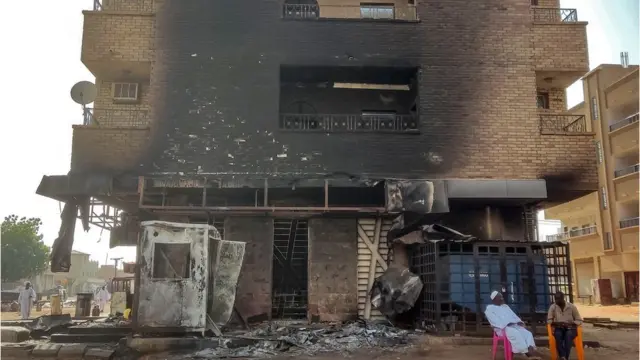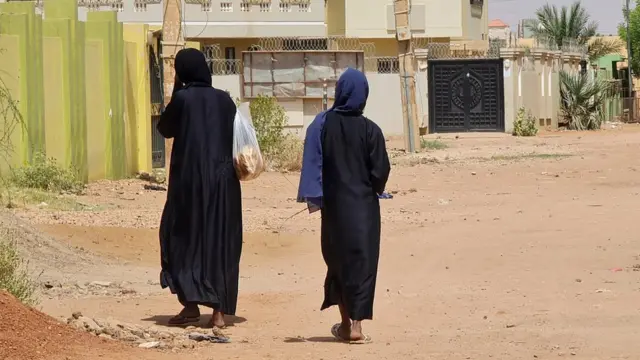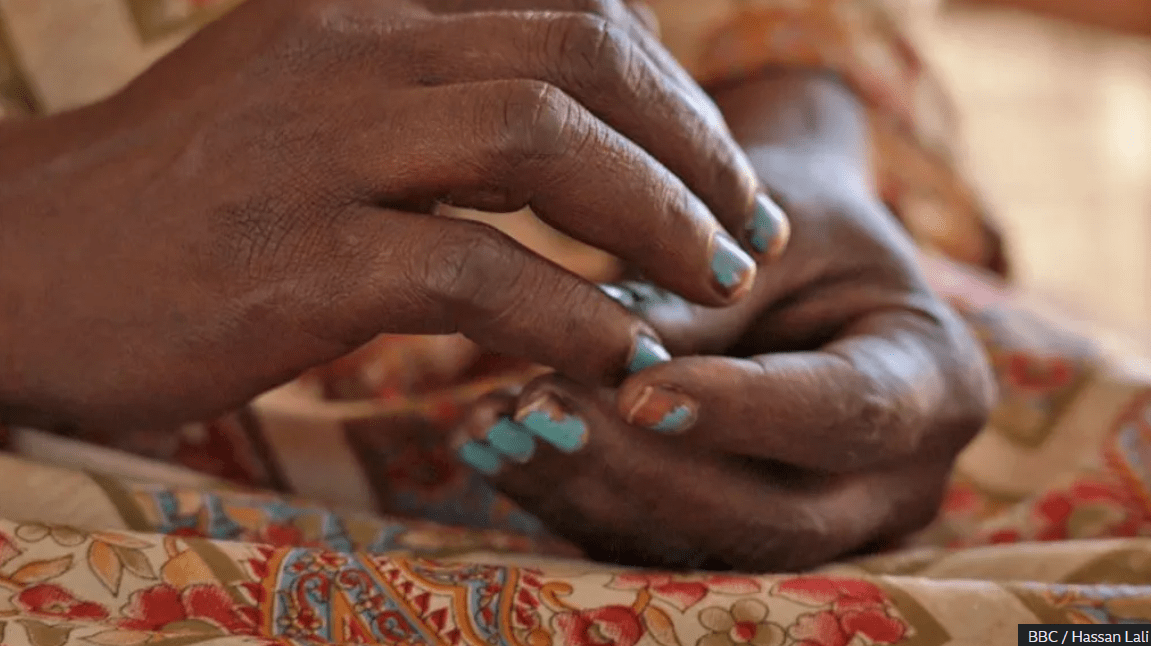As four paramilitary fighters for Sudan war-hit Dafur region dey gang rape Kolthom, na so dem dey abuse her sake of her race.
Warning: Dis article contain details wey fit dey painful for some readers
“Dem bin dey very brutal. Dem rape me one afta di oda under di tree, wia I bin dey gada wood to [make fire to] keep warm,”she tok as her voice dey shake inside phone.
We don change her name plus dat of anoda rape survivor wey we quote for dis article.
Kolthoum, wey dey her 40s, come from West Darfur black African Masalit community, but her rapists na Arabs from di Rapid Support Forces (RSF).
Dis paramilitary group don chop accuse say dem commit plenty crimes inside conflict wey many pipo dey see as racial and ethnic kasala for Darfur.
Kolthoum bin dey live for El Geneina – but now, she don run comot for di place wit her sick husband and children.
Kolthoum tok say her rapists bin tell her to comot di city as e “belong to di Arabs”, dis don add to di fear wey many black Africans get, say di RSF and di sojas wey dey support dem wan turn di area wey pipo from different ethnic regions dey live into area wey Arab go dey control.
Sudan civil war

Wia dis foto come from, Getty Images
Di civil war wey dey go on for Sudan start for mid-April, afta dia two most powerful generals – army chief Abdel Fattah al-Burhan and RSF commander Mohamed Hamdan Dagalo, wey pipo sabi as “Hemedti” – get kwanta.
Dia fight don bring back di conflict for Darfur, wey bin first start for 2003, and cause di deaths of about 300,000 pipo for di region.
RSF fighters don chop accuse say dem carry out crimes for Sudan most populous state – Khartoum, di kontri capital.
Di paramilitaries dey control most part of di state, as di army don fail to push dem back. Di fighting don make nearly two million pipo run comot Sudan since mid-April.
For Khartoum, di violence neva take racial or ethnic dimension. Arabs plus pipo from oda ethnicities na victims of di ongoing battles.
‘Three pipo gang-rape me as I dey go my aunt house

Wia dis foto come from, Getty Images
Ibtissam wey be 24-year-old tell BBC say she bin dey on her way to go visit her aunt wen three RSF sojas stop her.
“Dem pull dia guns on me and ask me wia I dey go. Wen I tell dem say I dey go my aunt house, dem accuse me say I be part of di army intelligence services.”
Di sojas force her to enta dia car, come carry her go one nearby house.
“I see anoda man inside di house, wit only underwear. I bin try to run but one of di sojas hit me so hard, I fall down to di ground. Dem threaten to kill me if I move or shout again,” she tok as she dey cry on di fone.
“Di three of dem rape me one afta di oda more dan once. Dem carry me back go dia car, later throw me for side of di road wen di sun don go down,” she tok.
Ibtissam say she bin feel “seriously embarrassed and angry”.
“I bin wan kill myself. But I hold am togeda. I go back house and no tell anybody wetin happun.”
Di UN Human Rights office for Sudan for early July tok say dem don receive reports of 21 incidents of sexual violence against at least 57 women and girls.
UN human rights chief Volker Türk note say, “dem don identify di RSF as di perpetrator” for almost all di cases dem report to dia office.
Both di UN and local rights groups believe say dis dey small to di real scale of di crime.
Di RSF don deny say na dia fighters dey behind dis attacks.
For inside one voice recording wey dia tok-tok pesin, Mohammed al-Mukhtar send to BBC, e say dia fighters dey “committed to di highest ethical standards of warfare”.
“Deliberate campaigns don dey to spoil di reputation of our fighters afta di military victories we don achieve,” e add.
Wen I tell am say I don follow women wey identify RSF fighters as dia attackers tok, Mr al-Mukhtar tok say na pipo wey dey pose as RSF members dey responsible for di crimes.
Di conflict don leave survivors of rape and sexual violence wit little help.
Most hospitals no dey work again, and e dey difficult to reach di few ones wey dey work.
Kolthoum and Ibtissam tell me say di pain go worry dem forever.


